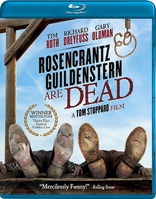Rosencrantz & Guildenstern Are Dead Blu-ray Movie
HomeRosencrantz & Guildenstern Are Dead Blu-ray Movie 
RLJ Entertainment | 1990 | 118 min | Rated PG | Jan 12, 2016Movie rating
7 | / 10 |
Blu-ray rating
| Users | 0.0 | |
| Reviewer | 3.5 | |
| Overall | 3.5 |
Overview
Rosencrantz & Guildenstern Are Dead (1990)
Showing events from the point of view of two minor characters from Hamlet, men who have no control over their destiny, this film examines fate and asks if we can ever really know what's going on?
Starring: Gary Oldman, Tim Roth, Richard Dreyfuss, Iain Glen, Ian RichardsonDirector: Tom Stoppard
| Comedy | 100% |
Specifications
Video
Video codec: MPEG-4 AVC
Video resolution: 1080p
Aspect ratio: 1.85:1
Original aspect ratio: 1.85:1
Audio
English: DTS-HD Master Audio 2.0 (48kHz, 24-bit)
Subtitles
English SDH
Discs
50GB Blu-ray Disc
Single disc (1 BD)
Playback
Region A (locked)
Review
Rating summary
| Movie | 3.5 | |
| Video | 3.5 | |
| Audio | 3.5 | |
| Extras | 4.0 | |
| Overall | 3.5 |
Rosencrantz & Guildenstern Are Dead Blu-ray Movie Review
To Bystand or Not to Bystand
Reviewed by Michael Reuben January 16, 2016Rosencrantz and Guildenstern are two of the least important characters in Shakespeare—or at
least they used to be. In 1966, writer Tom Stoppard promoted them to the leads in his first major
play, creating a modern classic and making the title Rosencrantz and Guildenstern Are Dead a
familiar catchphrase even for people who aren't quite sure in which Shakespeare play the duo
appears. For the record, the play is Hamlet, and Stoppard's title is a line from Act V. One of the
many ironies of Stoppard's prolific career is that he's best known for a phrase he didn't write
himself.
Now 78, Stoppard is one of England's leading writers, despite the fact (or maybe because of it)
that English isn't his native tongue. (His family fled Czechoslovakia in 1939 ahead of the Nazi
occupation.) For over half a century, he has written for screen, stage and television, racking up
both commercial success and an array of awards, including an Oscar and a knighthood. Despite
his many screen credits (including a rewrite of Indiana Jones and the Last Crusade), Stoppard
considers himself primarily a playwright and has routinely refused offers to transfer his plays to
the screen. To date, Rosencrantz and Guildenstern—or "Ros/Guil", in an abbreviation chosen by
the author himself—is his only play to be filmed. Stoppard wrote the screenplay and, because of
financing quirks, he also directed, for the first and only time.
Ros/Guil picked up the Golden Lion at the 1990 Venice Film Festival and received favorable
reviews when it was released to theaters the following year, but no one expected a Shakespeare-themed film to become a popular hit. (The exception
that proves the rule, Shakespeare in Love,
was co-written by Stoppard.) Fans of the film had to wait until 2005 to get it on DVD. Image,
which released that disc, has now issued the film on Blu-ray, including a new interview with the
writer/director.
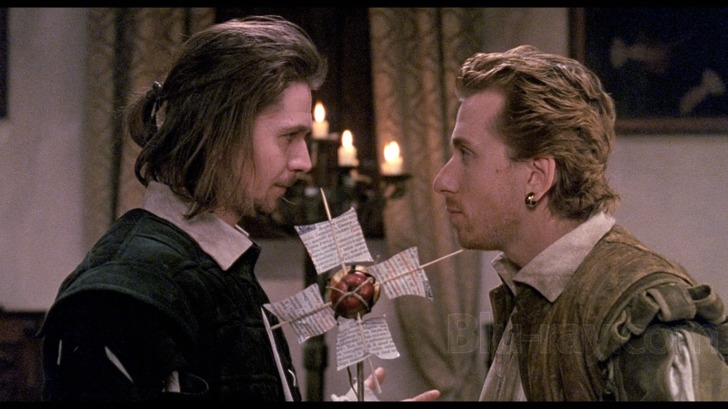
In Shakespeare's play, Rosencrantz and Guildenstern are two boyhood friends of Prince Hamlet, who are summoned to Elsinore Castle by King Claudius, Hamlet's uncle, in an effort to cheer up (and maybe keep an eye on) the young prince, who is distraught over his father's recent death. In fact, Hamlet's father was poisoned by Claudius, who then married Hamlet's mother and stole the throne. The prince's friends arrive at the castle at the same time as a traveling theater company, with which Hamlet arranges a performance of a play mimicking the circumstances of his father's murder. Enraged by Hamlet's antics, King Claudius sends him to England with Rosencrantz and Guildenstern, giving them a letter to the English king asking him to have Hamlet executed. En route, Hamlet discovers the letter and substitutes the names of Rosencrantz and Guildenstern for his. At the play's end, a message from England reports that "Rosencrantz and Guildenstern are dead".
Ros/Guil tells exactly the same story, but from the two friends' perspective. It opens with Rosencrantz (Gary Oldman) and Guildenstern (Tim Roth) traveling on horseback to Elsinore, after they have been summoned. Once there, they play all the scenes in which Shakespeare had them appear, being greeted by King Claudius (Donald Sumpter) and Queen Gertrude (Joanna Miles), speaking with the royal counsellor Polonius (Ian Richardson), and attempting to cheer up their friend Hamlet (a young Iain Glen, currently Jorah Mormont on Game of Thrones). They attend the players' performance, after which they make the fateful trip to England.
But the real story of Roz/Guil is what occurs between Shakespeare's scenes. As Hamlet's two friends wait "in the wings" for their scenes to come around, they must find ways to pass the time. They invent games, debate philosophical issues and attempt to understand their place in the larger events happening around them, of which they catch occasional glimpses through windows and from balconies. They also try (without success) to recall who they are, since they have no memory of anything before they were summoned to the castle. Bit players in the drama, they must struggle to see beyond the limitations of the roles for which Shakespeare created them.
A running joke throughout Ros/Guil is that no one remembers which friend is which, but in fact they have very different personalities. Guildenstern, the more aggressive of the pair, is precise at logic and skilled in the nuances of language. Asked by Rosencrantz whether "Death" could possibly be a boat (as the ancient Greeks imagined), Guildenstern analyzes the question carefully:
G: No, no, no . . . Death is "not". Death isn't. Take my meaning? Death is the ultimate negative. Not-being. You can't "not be" on a boat.
R: I've frequently not been on boats.
G: No, no . . . What you've been is "not on boats".
Rosencrantz, the more pragmatic and easygoing half of the pair, is given to creating small inventions like a paper airplane or a pinwheel driven by steam. He also seems to be preocuppied by death, offering his own variations on the many contemplations of mortality that Shakespeare wrote for Hamlet to speak:
R: Whatever became of the moment when one first knew about death? There must have been one. A moment. In childhood. When it first occurred to you that you don't go on forever. Must have been shattering. Stamped into one's memory. And yet, I can't remember it. It never occurred to me at all. We must be born with an intuition of mortality. Before we know the word for it. Before we know that there are words. Out we come, bloodied and squalling, with the knowledge that for all the points of the compass, there's only one direction. And time is its only measure.
In such considerations and debates do the two friends pass the time, much like the tramps in Waiting for Godot, except that Rosencrantz and Guildenstern have no one to await, merely scenes to play until there are no more left in which they appear. And what happens next? Presumably, after Rosencrantz and Guildenstern are executed in England, they spring back to life at the next performance of Hamlet, only to repeat the same inquiries, questions and encounters. A portent of their future appears at the beginning of Ros/Guil, when the companions make the startling discovery that a tossed coin always comes up heads, defying all the laws of probability. To Guildenstern, this indicates that natural forces have been suspended and that "we are now held in the power of un-, sub- or supernatural forces", but he is unable to persuade Rosencrantz to follow his thinking. Nor is he able to discern what forces are guiding their fate, no matter how hard he tries.
Cryptic hints about those forces are supplied by the Player King (Richard Dreyfuss), head of the acting troupe that performs at Elsinore and, like Rosencrantaz and Guildenstern, a bit player in Hamlet. Still, though his role at the Danish court may be small, the Player King seems to have a better understanding of this world and the roles of those who wait for their next scene. After fulfilling Hamlet's charge to confront King Claudius with a re-enactment of the murder he committed, the Player King also shows Rosencrantz and Guildenstern the finale of Hamlet, including their own fates as hanged men. It's not as if the Player King knows the future, but he does understand that, in a narrative work of art, "events must play themselves out to an aesthetic, moral and logical conclusion. . . . Generally speaking, things have gone about as far as they can possibly go when things have got about as bad as they can reasonably get." But who decides these things, demands Guildenstern, ever the rationalist. To which the Player King replies, with magisterial authority: "It is written!"
Try to nail down Roz/Guil's meaning, and you may find yourself tongue-tied, because Stoppard's characters are better at asking questions than providing answers. Indeed, "Questions" is one of the games payed by Rosencrantz and Guildenstern to pass the time, and a player who answers a question with a statement loses a point. As often as people have asked, "What is this play about?", no clear answer has been forthcoming. The young Stoppard once responded that "It's about to make me rich!", an answer that aptly captures Ros/Guil's playful spirit (though Stoppard later regretted his joke when it was quoted back to him repeatedly). For the filmed version, Stoppard took advantage of the medium's visual potential to incorporate more physical comedy, often making the main characters feel like a vaudeville team, with no higher purpose than to elicit laughter.
Ros/Guil's main flaw is its extended running time, which, at almost two hours, is at least twenty minutes too long. On the stage, Stoppard's balance of incessant mockery in the face of Hamlet's parade of violent death and high rhetoric creates a giddy sensation of distorted perception, but it's a delicate effect that the film never quite achieves, becoming top-heavy with puns, paradoxes and physical shtick. When Rosencrantz and Guildenstern are finally hanged at the end, the event is neither comic nor tragic. It's just time to go.
Rosencrantz & Guildenstern Are Dead Blu-ray Movie, Video Quality 
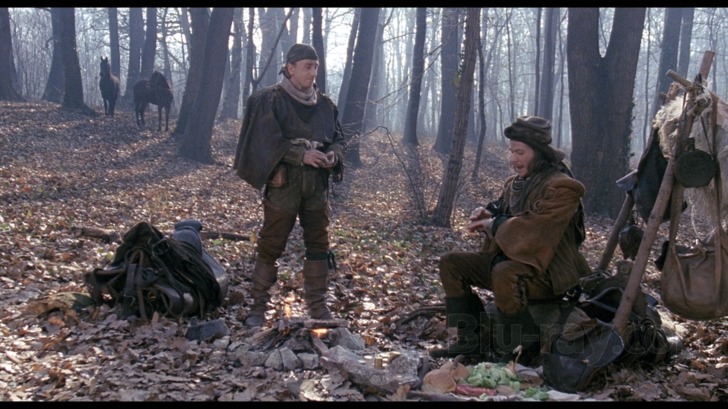
Rosencrantz & Guildenstern Are Dead was shot on film by Oscar-winning Welsh
cinematographer Peter Biziou (Mississippi Burning),
whom Stoppard credits for the film's visual
appeal. RLJ/Image Entertainment's 1080p, AVC-encoded Blu-ray presents a solid, film-like
transfer, with sufficient detail to pick up the extensive rock formations and woodlands through
which the lead characters make their journey to Elsinore, as well as the ornate decor of the royal
court. (Ros/Guil was shot in the former Yugoslavia, which gives the locale an exotic,
otherwordly quality.) The film's grain has been retained and will strike some viewers as
objectionably heavy in certain shots that appear to have been either shot in low light or, possibly,
blown up in post-production. The image also suffers from occasional video noise, e.g., in the
opening shot when the camera is furthest from the figures on horseback. Otherwise, contrast is
good, black levels are appropriate, and the color palette establishes a suitable contrast between
the earth-toned bystanders, Rosencrantz and Guildenstern, and the brighter colors of just about
everyone else. The source material is in very good condition, and except for the aforementioned
video noise and a touch of light sharpening here and there, no anomalies or distortions appeared.
Image/RLJ has mastered Ros/Guil with an average bitrate of 24.89 Mbps, which is adequate
when one considers the number of scenes where the "action" is primarily verbal.
Rosencrantz & Guildenstern Are Dead Blu-ray Movie, Audio Quality 
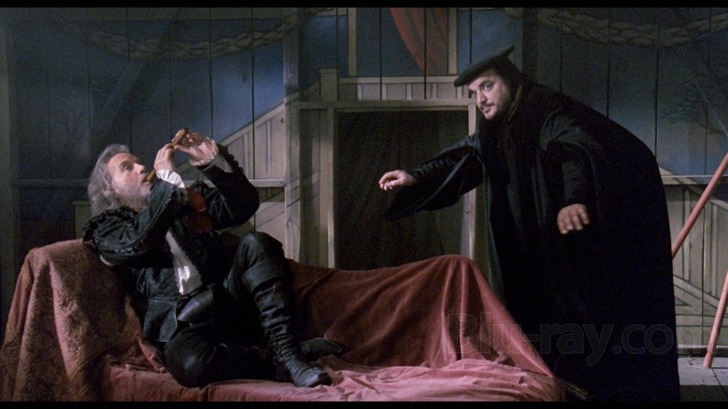
Ros/Guil's original stereo soundtrack has been encoded in lossless DTS-HD MA. It's a modest affair, with clearly recorded dialogue and only an occasional sound effect that takes advantage of stereo separation. (An early example is the distant cry of a wild animal when Rosencrantz and Guildenstern are camped out in a forest.) The most elaborate sound effects are those accompanying the performances of the Player King's troupe. Stanley Myer (The Boost) composed the spare score.
Rosencrantz & Guildenstern Are Dead Blu-ray Movie, Special Features and Extras 
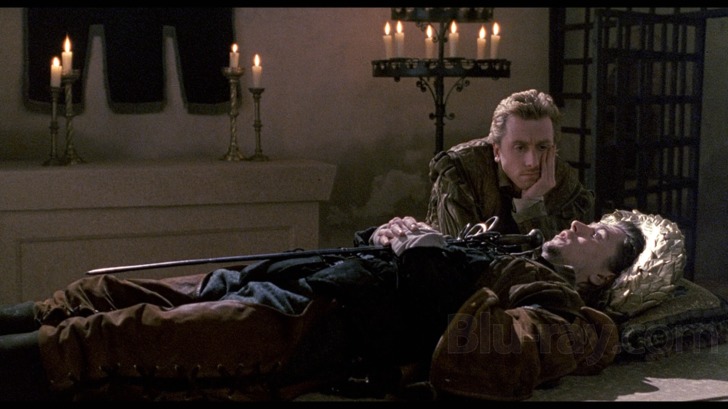
The extras include the four interviews previously appearing on Image's 2005 two-disc DVD
edition of Rosencrantz & Guildenstern Are Dead. These are preceded by a new "25th
Anniversary" interview with playwright and director Tom Stoppard. All of the interviews were
done by the film's producer, Michael Brandman, and all of them range broadly over the entire
career of the interviewee. Thus, Stoppard speaks about his other work (in both the old and new
interviews), while Roth, Oldman and Dreyfuss discuss their acting careers in general. Ross, for
example, talk about making Reservoir Dogs, while
Oldman speaks of his admiration for Francis
Ford Coppola, for whom he starred in Bram Stoker's
Dracula. All of the interviews are
worthwhile, even for those who are not fans of Ros/Guil.
- 25th Anniversary Interview with Tom Stoppard (1080p; 1.78:1; 55:37).
- Tom Stoppard (480i; 1.33:1; 59:09).
- Gary Oldman (480i; 1.33:1; 58:27).
- Tim Roth (480i; 1.33:1; 32:56).
- Richard Dreyfuss (480i; 1.33:1; 45:30).
Rosencrantz & Guildenstern Are Dead Blu-ray Movie, Overall Score and Recommendation 
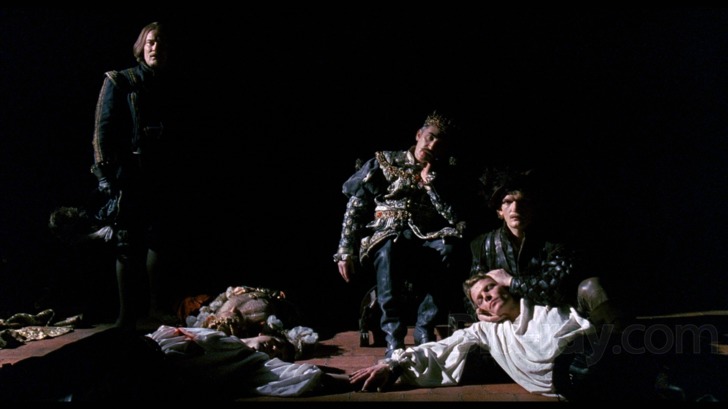
Stoppard's plays became more realistic and less evasive as his career progressed, but he has only
recently become interested in translating any of the later works to film. (In the new interview, he
discloses that he recently completed a screen adaptation of Arcadia, a tale about romance and
physics, which many consider his best work.) At least for now, Ros/Guil is unique in being the
sole Stoppard creation that is readily available for anyone outside the theater-going public.
Image/RLJ's presentation is solid and serviceable, with unusually good extras. Recommended,
though not as a blind buy. Stoppard's world isn't for everyone.
Similar titles
Similar titles you might also like

Special Dead
2006

How to Talk to Girls at Parties
2017

The Freddie Mercury Tribute Concert
1992

Led Zeppelin: Celebration Day
2012

Bee Gees: One Night Only
1997

Mozart: Die Zauberflöte
The Magic Flute / Royal Opera, Covent Garden
2003

Flawless
1999

Once Were Warriors
Slipcover in Original Pressing
1994

George Carlin: Life Is Worth Losing
2005

God's Pocket
2014

Blue in the Face
1995

Save Your Legs!
Limited Edition to 3000
2012

The Impostors
1998

Brighton Beach Memoirs
1986

Flirting with Disaster
1996

Tunnel Vision
Tunnelvision / MVD Rewind Collection
1976

The Groove Tube
1974

My Favorite Year
Warner Archive Collection
1982

Waiting for Guffman
1996

MADtv
1995-2009
